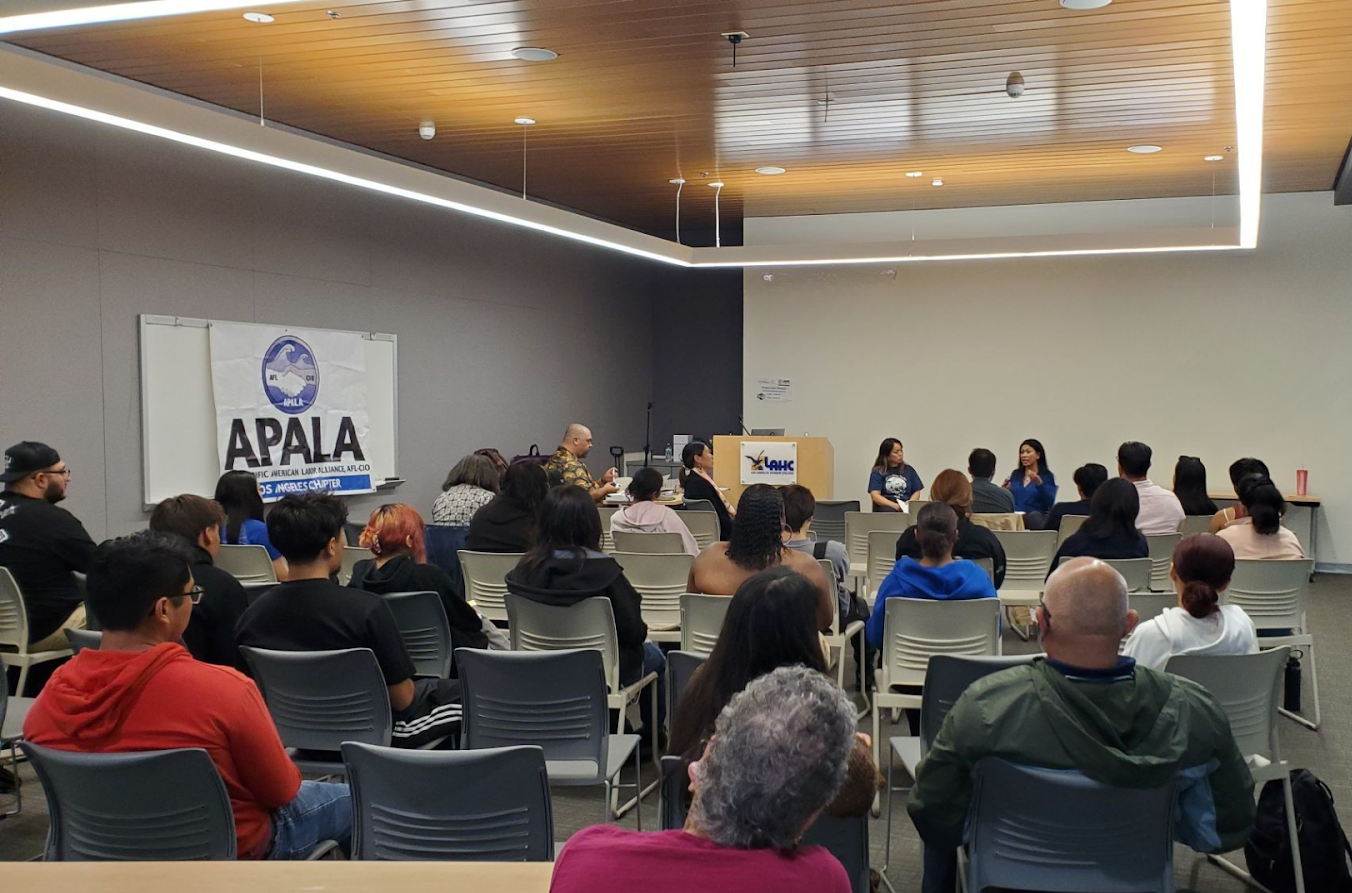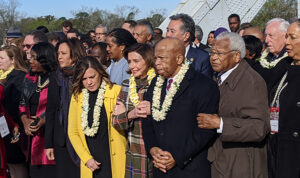
By: Emmelle Israel, graduate student researcher for AARJ
On October 17, 2024 the UCLA Labor Center’s Asian American Racial Justice (AARJ) program hosted a panel of Asian Pacific Islander Desi American (APIDA) healthcare workers at Los Angeles Harbor College, in partnership with the Asian Pacific American Labor Alliance Los Angeles (APALA LA), the Dolores Huerta Labor Institute (DHLI) and Asian Pacific American Student Services (APASS) from Harbor College.
Facilitated by AARJ program coordinator Lisa Lei, guest speakers included Julie Ngin, a union representative at United Nurses Associations of California/Union of Health Care Professionals (UNAC/UHCP) and HK, a founding member of the youth advocacy group Empowering API.
Ngin and HK share their reflections on the panel and the importance of supporting APIDA students who are beginning their healthcare careers.
How have your personal experiences influenced your perspectives on healthcare?
HK: I grew up seeing people who looked like me working in hospitals, yet my own family often struggled to access basic care. That contrast stayed with me. Why were my family members going through Tylenol and Advil every single day? Why couldn’t they have insurance? My intersectional identities as an APIDA racial minority, undocumented immigrant, and my family’s low socioeconomic background meant I couldn’t access the same healthcare resources as others in the APIDA community who have no issues with immigration documentation. I see this issue of lack of representation and understanding as endemic of broader structural issues with our healthcare system.
Ngin: My decision to pursue healthcare as a career was rooted in the suffering I saw as a child in Cambodia, during the reign of the Khmer Rouge. I saw people getting bombed, and I passed out. I remembered waking up as a young girl, curled up and crying that I couldn’t do anything to help the people suffering around me. I thought if one of us had knowledge in healthcare, then maybe we could’ve saved more people. I told myself then, “I want to save lives.”
How did you get involved in labor organizing?
HK: I was an organizer with Empowering API as an undergrad, acting as a campaign coordinator on the group’s Opportunity for All (O4A) campaign. I was a senior at the time and I extended my time in school after the UC regents rejected O4A. I then worked on the campaign throughout its time in the legislature. Now, I’m doing what I can to support organizing by staying updated on what’s happening with immigrant rights so that I’m able to be an advocate.
Ngin: I knew my hospital had a union, but I wasn’t very involved at first. I was busy and taking care of my older parents, so my schedule was tight. But, I was a well-known and well-respected senior nurse at my hospital, and I knew what it meant to be a leader from my dad’s example. Whenever something needed to happen in our unit, like organizing parties or events, I was asked to do it. My union noticed that and called me if they needed our unit to turn out or do something for our union. Then one day, my union president got sick, and she asked me from her hospital bed to take on the role, so I had to step up to take on the job. I put my full effort into it as the president of that local. A year later, UNAC reached out to me to become a staff representative.
What role does mentorship play in labor and healthcare?
HK: Mentorship has played such a big role in my journey. I’ve learned that success often isn’t just about intelligence—it’s about having the right support systems and knowing where to turn for help. Kent Wong and Lisa Lei really emphasize empowering the next generation of advocates and giving them the tools and resources to navigate what’s coming up.
Ngin: As a seasoned nurse, I bring experience and knowledge that I can share with newer nurses. I like to see young people learning. It’s important to create a space where they feel comfortable asking questions and know they can trust you. I see it as my role to build that bridge for students and extend a hand to help others come onboard.
What do you hope students took away from this panel?
HK: The importance of community. My community galvanizes the energy I have in my studies. I know where to go if I need emotional support or mental support. I know that I am in a safe space when I talk to people from my community. If I face difficulties in school, I know I have a community to turn to who can support my growth. You have a community to rely on.
Ngin: I hope they learn the history of what previous healthcare workers have been through. If people know ahead of time what they’re getting into, they can be prepared. I want to give upcoming people the power to ask for what they need. Pre-information is always good. I hope they learn and find their way in the system so that they get what they need to be successful. I also want them to know how a union can help them in situations. It took me five years before I realized that there was a union at the hospital where I worked. So now, as a union representative, I always go to the new hires’ orientation. I want them to know that even though they are new, they are not helpless. But, you can’t ask for what you don’t know you need.



